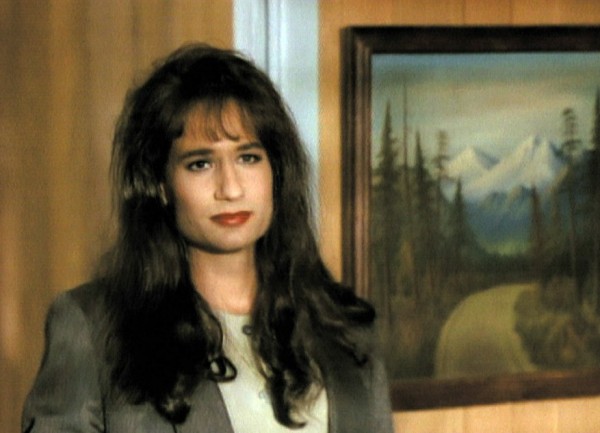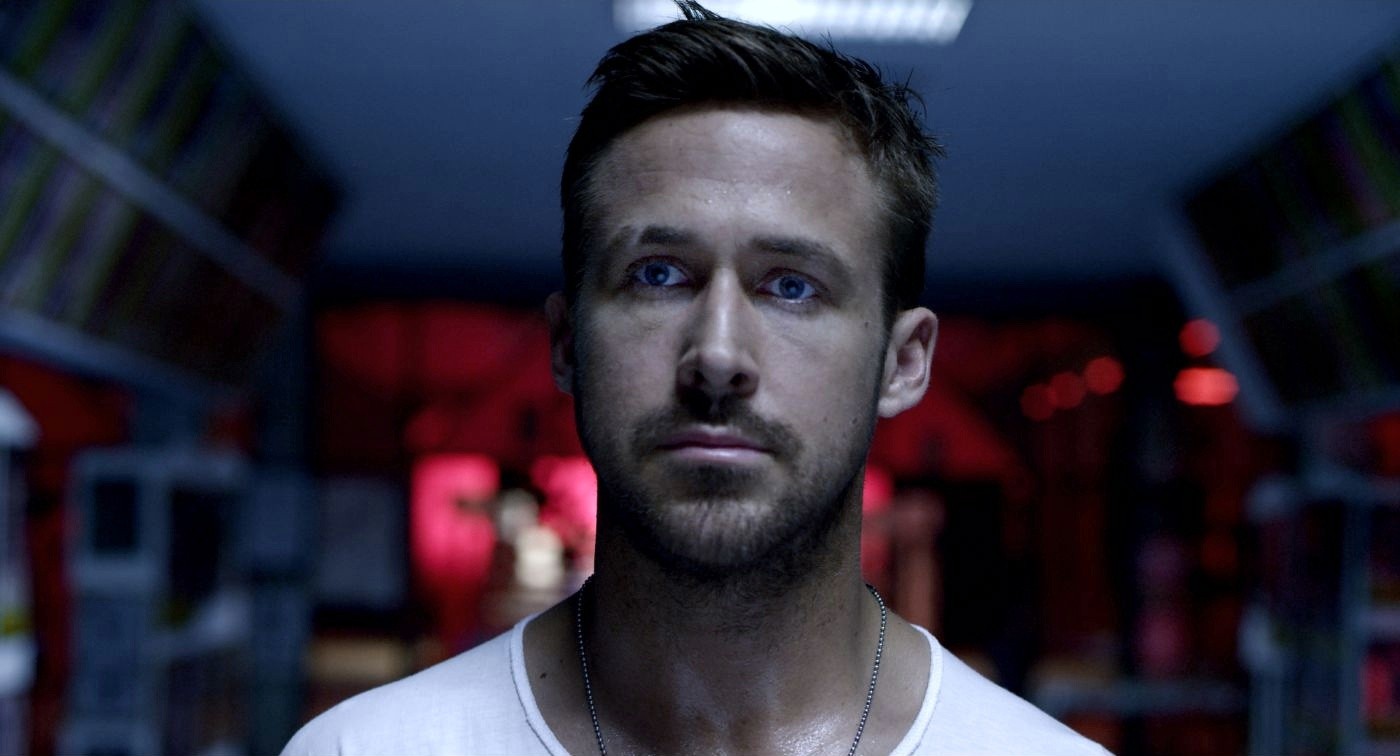Some movie news plus videos to look at
1. Peter Greenaway and Jean-Luc Godard have made a 3D omnibus film (along with one Edgar Pêra). The 2D trailer is here, and you can find information online: CinemaScope / Fandor / The Hollywood Reporter / Mubi / Variety.
2. Guy Maddin is planning a moving-picture adaptation of Sparks’s radio drama / concept album / opera-thingy The Seduction of Ingmar Bergman.
3. A lot of people don’t know that David Lynch once made a video for Sparks, but you’re not one of them:
And this is also relevant.
4. While we’re all here, we might as well look at this.
5. As well as this. Pretty well-done, no?
DAVID LYNCH’S DESTABILISING AFFECT
 GOOD DAY TODAY: David Lynch Destabilises the Spectator
GOOD DAY TODAY: David Lynch Destabilises the Spectator
By Daniel Neofetou
Zero Books, 2012
93 Pages, $14.95 (buy it at Amazon)
The initial conceit of Neofetou’s Good Day Today is one that I inherently agree with, and one that I think should be considered in larger terms of not only film studies, but an understanding of how to watch movies in general. As a theoretical construct it was first introduced to me in Cinema and Sensation: French Film and the Art of Transgression by Martine Beugnet, a brilliant study of affect found in the mileu of the “new french extremity,” the art house mavericks Bruno Dumont, Philippe Grandrieux, Catherine Breillet, and so on. While Beugnet’s book does lose itself to a final chapter devoted to a Deleuzean study of film & embodiment that, in my opinion, adds nothing to the first two-thirds of the study, overall the book presents and articulates, with careful, pointed examples, what cinema can do for the spectator.
Neofetou’s book, while seemingly not indebted to Beugnet’s book at all (something that I would argue is, in a sense, unfortunate) takes certain theories that have formerly been applied only to experimental (non-narrative) cinema, and looks at David Lynch’s films within this context. His thesis is that these modes of cinema, particularly within the diegetic sway of a narrative & representational film, serve to–as the title would suggest– destabilise, disorient the spectator, the viewer of the film. As such, the book offers a very close reading of a number of Lynch’s films–though the titles of note are, of course, Inland Empire, Lost Highway & Mulholland Drive–& the scenes therein, showing the reader just exactly how Lynch manages to simultaneously play with affect while still insisting upon the “rules” of narrative/figurative/”realist” cinema to the point where when the rules are broken, we are destabilised not because said scene doesn’t make “sense,” but because the scene violates the inherent logic of the film & undermines the authority of an omniscient narrative position.
And the book does this well. Neofetou, throughout the book, takes examples from a number of canonical experimental films (Meshes of the Afternoon, Flaming Creatures, Gidal’s Epilogue) and compares their techniques to the techniques of certain scenes found in Lynch’s films, highlighting both the similarities between the scenes & the differences that arise out of the context of the films as a whole. There’s also a brilliant chapter near the end of the book dedicated to the idea of Lynch’s use of pop-music, absent dialog, and sound, that is a great chapter in its own capacity in looking at the way audio works toward the viewer in a cinematic exegesis.
Another strong point of the book is that within his examination of Lynch as a filmmaker who works with affect more than representation, Neofetou does an excellent job of both rejecting and explaining this rejection of the idea that Lynch’s films are “puzzles” to be solved–closed films where there is a literal solution. This, of course, is ridiculous, and a repeated mode of viewing that I personally find insufferable because, as Neofetou points out that Sontag mentions in her essay Against Interpretation, this mode of viewing “blinds [the spectator] to the work’s sensual facets”.
The book is not perfect, however, and there are two major faults that certainly don’t kill the book, but strike me as perhaps frustrating. The first being a short 7 page look at Lynch’s films through the eyes of the ‘Bechdel Test,’ ultimately considering accusations of Lynch’s films as misogynistic. Unfortunately the chapter ends up sounding apologetic instead of actually engaging with the idea, as its idea loses itself in a self-aware politically correct feedback loop that undermines any sort of look, thus rendering the chapter as blank space in terms of critical thought. I’m curious as to its place in the book, as there are repeated comments regarding Lynch’s ostensible a-political stance.
Which, in a way, leads to my other complaints–the subtitle of the book, the copy on the back, leads one to believe that after introducing (& proving) the idea that Lynch destabilises the spectator, there is little suggested beyond this in the text itself. There are a lot of directions that this could be taken, and the copy suggests that the book will take this idea in the direction that it helps to shake the politically hegemonic mode of representation, which helps to destabilise the idea of binary, simplicity, homogeneity.
April 30th, 2013 / 3:58 pm
Now Available: David Lynch’s solo album Crazy Clown Time
Pitchfork says: “Unfortunately, none of these songs actually feel like songs. Only a few have choruses or any significant chord changes. Instead, they’re set pieces, which makes sense: Lynch’s films often seem to be more about luxuriating in his atmosphere than about following his plots, and that carries over to this music as well.”
Paste says: “What a mess…Crazy Clown Time, recorded in Lynch’s personal studio with engineer Big Dean Hurley, isn’t exactly fart-blank, but this visual master shouldn’t quit his day job.”
The Atlantic says: “Lynch dares to disturb, and that requires a bravery that cares not for our comfort, but for the integrity of the art itself.”
NPR says: “It sounds absurd, yes, and Crazy Clown Time … won’t be for everyone. But you can be sure that no two people will come away with the same experience of this record, and there aren’t many artists working today who can make that claim.”
Why I Will Love David Lynch Forever

"Coop, I may be wearing a dress, but I still pull my panties on one leg at a time if you know what I mean."
I have been re-watching Twin Peaks for, literally, the first time in a decade. I first saw the series when the Season 1 DVD was released, unfortunately long before Season 2 ever saw a DVD release, on December 18th, 2001. I got the box-set for Christmas. I had never seen the series before, but in the midst of my Lynch obsession at age 15, I was pumped.
Since I’ve been re-watching it, I’ve been thinking a lot more about David Lynch than I have for years– at least since Inland Empire was released. While I know that Twin Peaks is specifically not exclusively the work of Lynch, in any sort of auteur sense, it certainly maintains a lot of elements that are specific to his aesthetics, and the episodes he himself directed are certainly the best of the series. The point is, I’ve been thinking about how awesome David Lynch is, and how really he is sort of the only ‘dark cult figure’ that I can still deal with after decades of obsession & attempting to navigate ‘fanboy’ culture (which, for the record, any sort of genre-based fanboy culture–actually just make that any sort of fanboy culture in general–is pretty much the most annoying thing in the world; I can no longer deal with the cult of Werner Herzog due to his incessant pandering & the caricature of himself that he’s fallen into (and the fact that Klaus Kinski is 100x more awesome than Herzog while Herzog gets all the credit majorly pisses me off)). Anyway, the point is I’ve made a list of why I will love David Lynch forever.
1. David Lynch understands the idea that films are more than just a representational narrative, rather, they are experiences in their own right.
2. David Lynch is not afraid of unwavering intensity. In fact, he loves it, and uses it to a very strong degree. Within the first season of Twin Peaks, made for prime-time network television, after establish a jovial tone filled with the lower-middle class & hat-tips to coffee and pie (“americana”), there are strobe lights, sexual perversions, and intense screaming & crying. This is not Lynch pandering towards “revealing the dark underbelly of suburbia”– maybe that is what Blue Velvet did, but I’d argue it’s more likely that Lynch is just prone to exploring this intensity in various environments (which if you ask me, the rest of his filmography seems to prove).
READ MORE >
Mulholland Drive, the TV pilot. From Mark Gluth (and the Dennis Cooper blog), Didion vs. Lynch.
Today David Lynch is answering interview questions on his twitter feed: “When I go out, Kathy who cuts my hair has given me a spray, but I don’t know the name of it.” [Q stream found here.]
On Influence: Anger Lynch Cage Rauschenberg
The first Kenneth Anger film I saw I think was Kustom Kar Kommandos. It was the first piece on a VHS compilation of his movies that my Satanic friend R. had. R. was a cousin of a kid I’d gone to elementary and middle school with, J., who one day I remember showing me a Polaroid of his other cousin having sex with a dog. We were on the smaller bus that went from the elementary school to my house, which was about a mile and a half. J. thought it was funny. I also first saw the word fuck written on that bus I think, though I didn’t say it out loud or know what it meant for another year.
Kustom Kar Kommandos was filmed in 1965 and was supposed to be the first of an eight part film about erotic teenagers and machines. Showing of this first section failed to help Anger get the money he needed to make the rest, so he gave up. Me and R. and another also Satanic kid, L., (I was not Satanic) watched the film that first time in the “play room” of my parents’ house, sitting all of us together on a futon. The play room was my first bedroom in the house but since my parents had built on, it now just kept all the old toys and games and other crap we never really used. By this point the room was basically storage. Today it still has several boxes full of junk I never unboxed after my loft got hit by the first tornado to land on downtown Atlanta, right on me.
August 9th, 2010 / 2:55 pm

